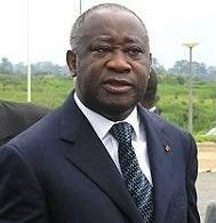ABIDJAN/WASHINGTON, (Reuters) – African nations have promised Ivory Coast President Laurent Gbagbo a “soft landing” in exile, a senior U.S. official said yesterday as pressure grew on him to concede last month’s disputed election.
The West African state has been in turmoil since the Nov. 28 vote in which Gbagbo claimed victory with backing from the nation’s top legal body, rejecting as fraudulent results showing he lost by a near 8 percent margin to rival Alassane Ouattara.
Rebels loyal to Ouattara exchanged fire with the army in Abidjan and elsewhere on Thursday while protests in Abidjan left at least 20 dead, raising worries of a return to all-out conflict in a country still split after a 2002-03 civil war.
“There is at least one African offer of a soft landing, but it is up to him to take it,” William Fitzgerald, the State Department official in charge of West African affairs, told Reuters in an interview.
He added that the United States was ready to impose travel sanctions on Gbagbo, his inner circle and their families within days if the crisis remains unresolved, echoing French threats.

European Union leaders on Friday also called on Ivory Coast’s army to defect from Gbagbo to Ouattara, while Kenyan Prime Minister Raila Odinga went further with a direct call for African nations to oust Gbagbo by force if necessary.
“Mr Gbagbo must be forced even if it means using military means to get rid of him because now he is just relying on military power, not the people’s power, to intimidate the people,” Odinga told a news conference in Nairobi.
“The African Union should develop teeth.”
The Ivorian military is seen as divided, but Gbagbo’s presidential guard, of unknown numbers, are diehard loyalists.
Alain Toussaint, a spokesman for Gbagbo, told Reuters in London: “The European Union call is totally irresponsible and scandalous.”
Cocoa exporters said most had shut down in the world’s top supplier since Thursday. Fear of a disruption to supplies has pushed futures prices close to four-month highs.




